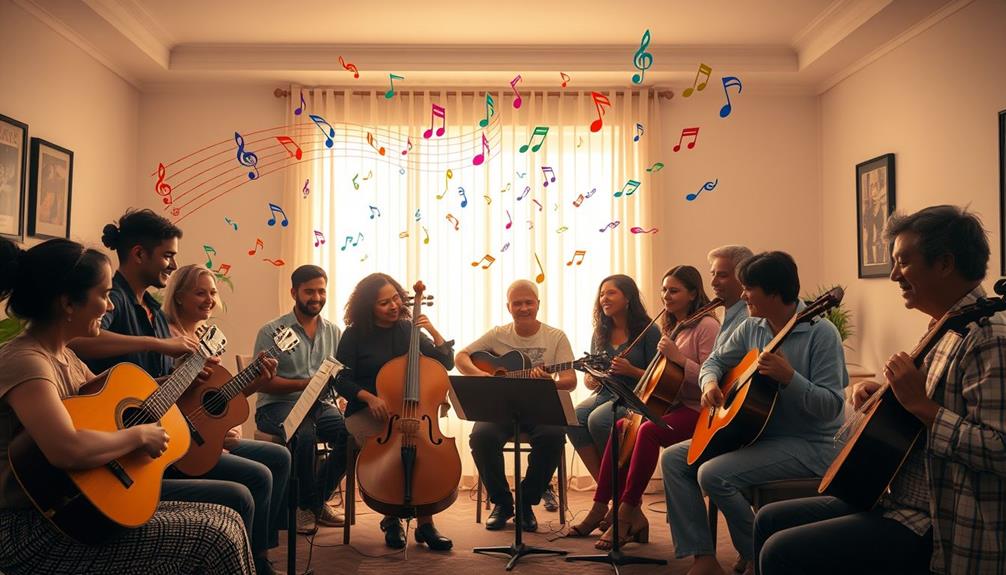Music therapy offers valuable support for children with special needs by utilizing music to enhance emotional expression, communication, and social skills. During sessions led by qualified therapists, your child engages in tailored activities that promote cognitive development and personal growth. Whether addressing challenges related to autism, ADHD, or learning disabilities, each session focuses on their unique needs, encouraging a sense of accomplishment and boosting self-esteem. With structured musical activities, they'll find a safe space to express themselves and connect with others. Discover how this impactful approach can benefit your child in various ways as you explore further. Music therapy benefits can also include improved motor skills and coordination, as well as enhanced attention and focus. Additionally, it provides a creative outlet for children to express their feelings and experiences in a non-verbal manner. Through the power of music, children with special needs can develop a greater sense of confidence and independence, making strides towards reaching their full potential.
Key Takeaways
- Music therapy enhances communication and emotional expression for children with special needs, particularly those with autism and learning disabilities.
- Tailored treatment plans address unique developmental needs, contributing to emotional regulation and social skills development.
- Engaging musical activities foster non-verbal expression, improving attention and focus in children with ADHD.
- Structured sessions promote self-esteem and confidence through tangible progress in musical skills and group interactions.
- Advocacy for music therapy highlights its essential role in IEPs, showcasing benefits in education and emotional well-being.
Overview of Music Therapy
Music therapy harnesses the power of music to help children achieve various therapeutic goals. This approach is particularly beneficial for kids with special needs, like those on the autism spectrum disorder (ASD). Qualified music therapists lead sessions lasting 15 to 60 minutes, focusing on tailored treatment plans that meet each child's unique developmental needs.
The incorporation of AI in music creation can enhance the therapeutic experience, allowing for personalized soundscapes that resonate with children's preferences.
In music therapy, you'll find that emotional expression and cognitive development are key targets. The interactive nature of these sessions encourages self-discovery and enhances communication skills. Through collaborative music-making, children can improve their social skills, making connections with peers in a supportive environment.
Moreover, music therapy is recognized as an essential component of special education. It can be effectively integrated into Individualized Education Plans (IEPs), allowing you to support your child's educational strategies.
Evidence suggests that engaging in music therapy not only boosts cognitive skills but also enhances speech and communication abilities. By participating in these sessions, your child can develop important social skills that will serve them well in various aspects of life.
Music Therapy Benefits for Autism
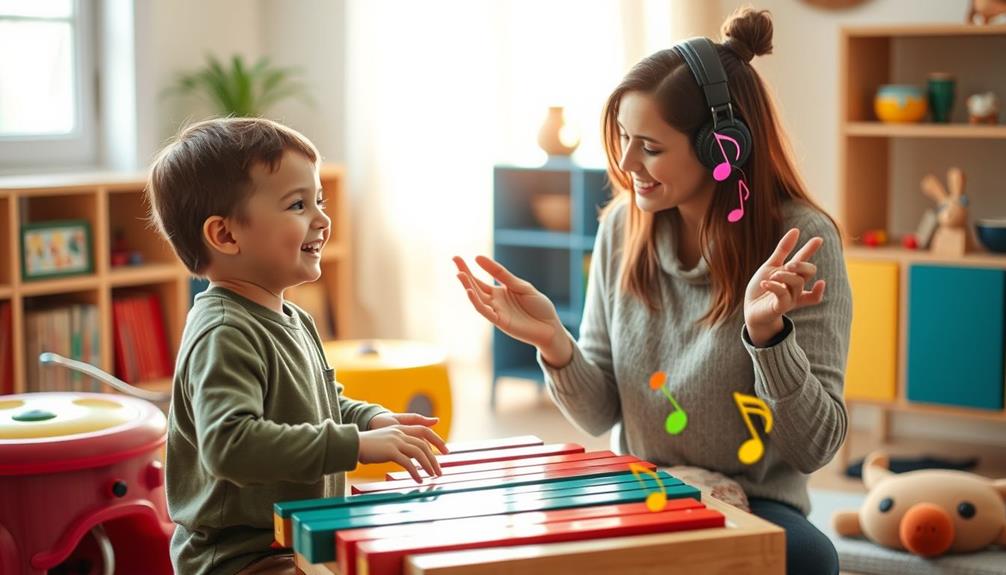
Music therapy offers incredible benefits for children with autism, especially in enhancing communication and emotional expression.
By engaging with music, you can help improve their social skills and provide a safe space for them to identify and share their feelings.
Incorporating essential tools for creating enchanting music tracks can further enrich these therapeutic sessions.
Plus, the rhythmic elements of music make learning and development more enjoyable and effective.
Communication Enhancement Through Music
A powerful tool in enhancing communication for children with autism, music therapy fosters non-verbal expression and emotional connection. Through engaging with music, you help your child develop essential communication skills. This approach allows children with autism to convey their feelings and emotions without the reliance on verbal language.
Additionally, structured play can complement music therapy by providing a framework for social interaction and collaboration.
Research shows that music therapy enhances emotional expression, enabling kids to identify and share their emotions more appropriately. The rhythmic elements of music not only support sensory organization but also play a significant role in improving verbal skill development.
As your child interacts with music, they often find it easier to engage in social interactions, bridging gaps in communication with peers and caregivers.
Moreover, evidence suggests that music therapy increases attention and focus, which can crucially boost overall communication abilities. By participating in music therapy sessions, your child can thrive in environments where communication might otherwise be challenging.
Ultimately, this therapeutic approach provides a universal medium for connection, making it a vital resource for fostering communication and understanding in children with autism.
Emotional Regulation and Expression
While many children with autism struggle to express their emotions verbally, engaging in music therapy can provide a powerful outlet for emotional regulation and expression. This therapeutic approach offers a non-verbal medium that helps children with autism spectrum disorder process and communicate their feelings more effectively.
Through structured musical activities, you can help your child learn to identify and appropriately express their emotions, greatly enhancing their emotional regulation skills. Additionally, incorporating stress management techniques can further support your child's emotional health during therapy sessions.
The rhythmic elements of music not only support sensory organization but also help calm anxiety, making it easier for your child to manage their emotions in various settings. Participating in group music therapy sessions promotes social interaction, allowing children to practice emotional regulation in a supportive environment.
This collaborative experience fosters the development of essential expressive skills and boosts communication abilities.
Research shows that music therapy greatly enhances emotional regulation and overall emotional well-being in children with autism. By using music as a tool, you can help your child navigate their emotions, improving their quality of life and fostering deeper connections with those around them.
Social Skills Development Activities
Engaging in music therapy can greatly enhance your child's social skills development, providing a unique platform for interaction and communication. Through structured sessions, children with autism spectrum disorder (ASD) can participate in activities that promote teamwork and emotional expression.
Additionally, like dogs, children can benefit from early socialization to develop well-rounded personalities. Here are three key benefits:
- Collaborative Music-Making: In group settings, your child will engage in collaborative music-making, fostering communication and enhancing their ability to work with peers.
- Role-Playing Activities: These activities help your child practice social scenarios, improving their understanding of social cues and enhancing turn-taking abilities.
- Non-Verbal Emotional Expression: Music offers an alternative way for your child to share feelings, allowing them to connect with others even without verbal communication.
Research shows that music therapy can lead to reductions in behavioral incidents and improve attention span, creating a more conducive environment for positive social interactions.
Music Therapy and Learning Disabilities
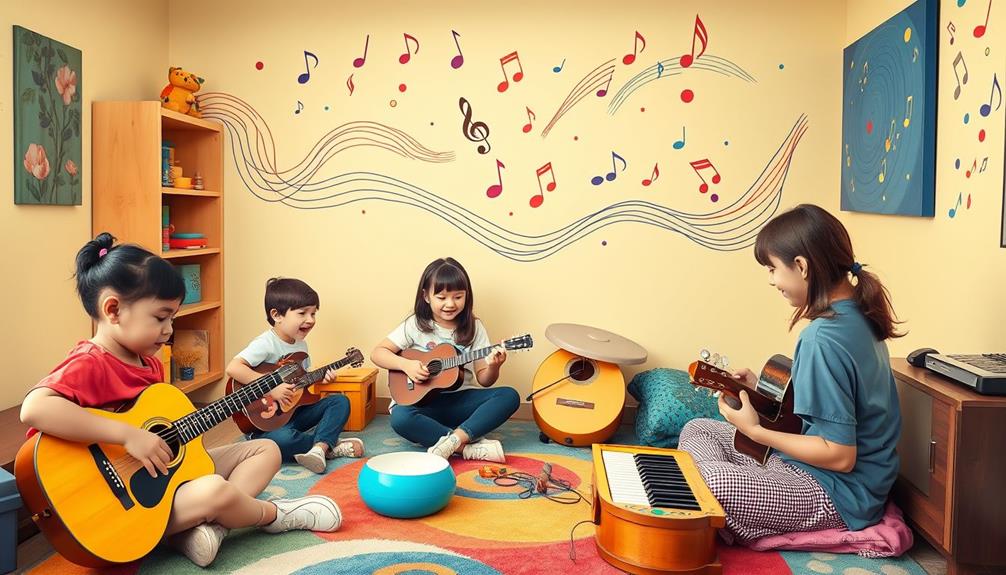
Music therapy can be a game changer for kids with learning disabilities, especially when it comes to enhancing literacy skills.
Incorporating healthy lifestyle blogs can provide additional insights into how music can positively influence overall well-being.
You'll find that the structured musical activities not only help them engage with academic content but also boost their self-esteem.
Enhancing Literacy Skills
A powerful tool for enhancing literacy skills, music therapy offers multisensory experiences that actively engage children with learning disabilities. By incorporating music into learning, you can help improve essential skills necessary for reading and writing.
Music therapy can also support auditory processing improvement, further aiding children in distinguishing sounds that are vital for literacy development.
Here are three key ways music therapy can boost literacy:
- Phonemic Awareness: Engaging with music helps children develop an understanding of sounds and syllables, which is vital for reading proficiency. Rhythms and melodies can make phonemic patterns more memorable.
- Focus and Memory: Structured musical activities enhance focus, memory, and organizational skills. These cognitive improvements directly support literacy development, allowing children to better process and retain information.
- Social Skills: Collaborative music-making fosters social interactions and peer relationships. This supportive environment encourages children to learn from one another, making literacy tasks feel less intimidating and more enjoyable.
Boosting Self-Esteem
Self-esteem plays an essential role in a child's overall development, especially for those with learning disabilities. Music therapy provides structured musical activities that promote confidence and self-esteem in children with special needs. By engaging in individualized music therapy sessions, you can help your child experience tangible progress in their musical skills, which fosters a sense of accomplishment and boosts their self-worth.
Incorporating elements like yoga for back pain management can further enhance your child's overall well-being, providing a holistic approach to their development.
Collaborative music-making is another key aspect of music therapy. It encourages social interaction, allowing children to feel valued and accepted within a group. This environment cultivates friendships and enhances peer relationships, contributing considerably to their self-esteem. As your child collaborates with others, they learn to express themselves and appreciate their unique strengths.
Research shows that participation in music therapy leads to notable behavioral improvements. As your child achieves their therapeutic goals, they'll likely experience increased motivation and confidence.
Music Therapy for ADHD
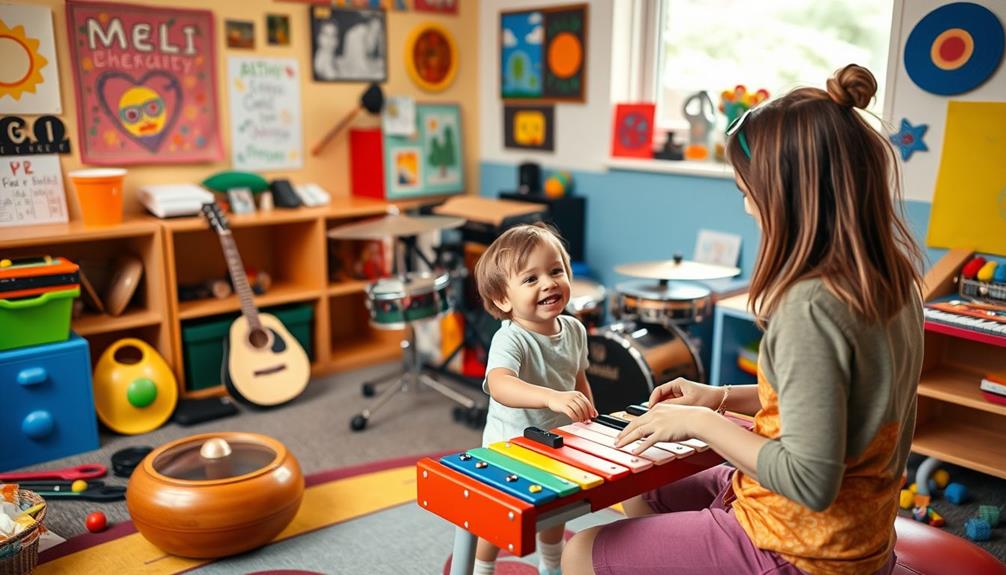
Many children with ADHD struggle to maintain focus and manage their emotions, but music therapy offers a promising solution. This holistic approach effectively complements traditional treatments by providing structure and engagement, which can greatly enhance their daily lives.
Additionally, research suggests that ethical considerations are essential in educational data mining for developing tailored interventions like music therapy, ensuring that children's unique needs are addressed.
Here are three key benefits of music therapy for students with special needs, particularly those with ADHD:
- Improved Focus and Attention: The rhythmic structure of music helps children concentrate better, making it easier for them to engage in tasks and lessons.
- Emotional Regulation: Structured musical activities promote emotional control and reduce hyperactivity, helping children manage anxiety symptoms more effectively.
- Social Skills Development: Group music classes encourage positive interactions, fostering social skills and boosting self-esteem among peers.
Music Therapy Techniques and Methods
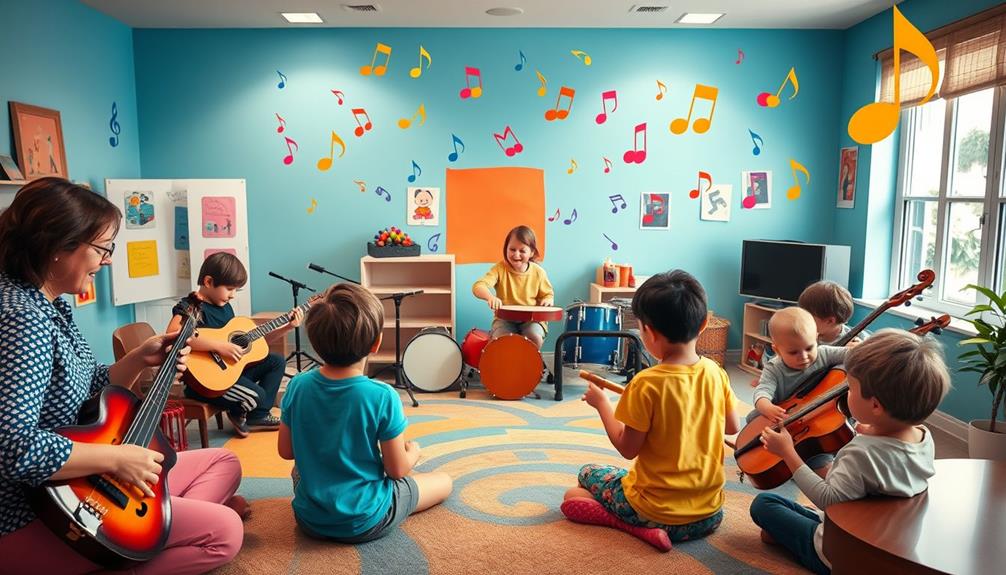
Music therapy techniques and methods are diverse, offering tailored approaches to meet the unique needs of children with special needs. These techniques include singing, instrument play, improvisation, and songwriting, all aimed at promoting self-expression and emotional processing.
Studies indicate that engaging in structured musical activities can enhance emotional connections, similar to how cats show emotional attachment to their owners. By engaging in structured musical activities like guided movement and rhythmic exercises, you can enhance motor skills and coordination while supporting self-regulation.
Collaborative music-making plays a crucial role in fostering social skills and peer interactions. As children create music together, they learn to build relationships and improve their communication abilities in group settings. This shared experience not only enhances their social skills but also encourages a sense of belonging.
Moreover, music therapy employs multisensory approaches that engage tactile, auditory, and visual elements, making learning more accessible for children with diverse needs. Through these sensory experiences, retention and understanding are markedly improved.
Importantly, music facilitates non-verbal communication, providing children with special needs an alternative means to express emotions and connect with others without relying on verbalization. In this way, music therapy serves as a powerful tool for growth and development.
Personalized Approaches in Music Therapy
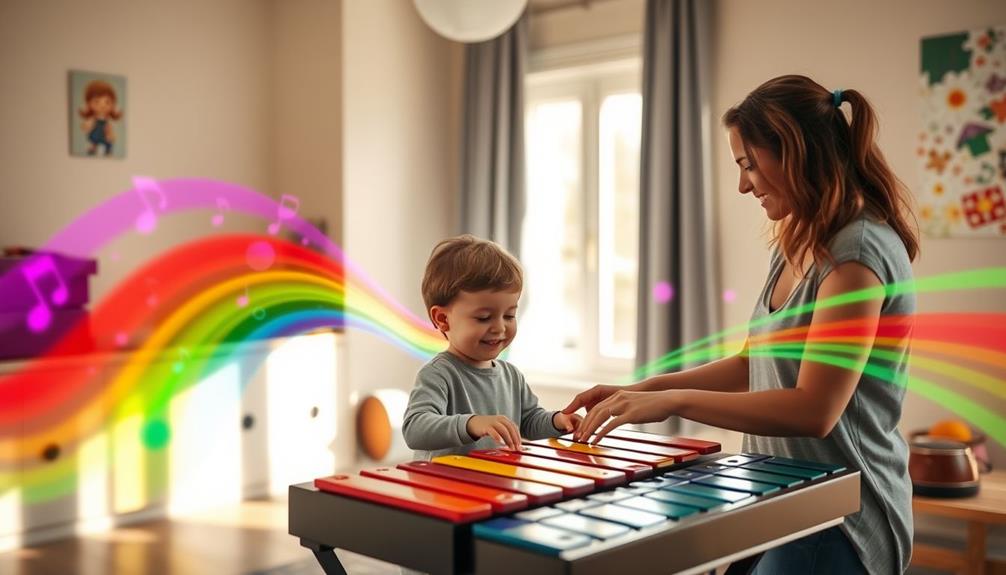
When you consider the unique needs of each child, personalized approaches in music therapy become essential for fostering growth and development. By utilizing individualized assessments, therapists evaluate each child's past experiences and preferences, ensuring their engagement in sessions. This tailored technique helps address specific challenges while leveraging individual strengths.
Here are three key components of personalized approaches in music therapy:
- Individualized Assessments: These evaluations help identify each child's strengths and areas for growth, informing the treatment plan.
- Tailored Treatment Plans: Each plan is designed to enhance communication skills, social skills, and emotional regulation, aligning with the child's Individualized Education Plans (IEPs).
- Structured Learning Environments: These settings create opportunities for self-expression, especially beneficial for non-verbal children, allowing them to communicate and connect through music.
Through ongoing assessments, therapists adapt treatment plans to meet changing needs and reflect progress. This dynamic approach not only fosters creativity but also empowers children by helping them develop essential skills in a supportive environment.
Personalized approaches truly make a difference in the lives of children with special needs, promoting their overall well-being.
Advocacy for Music Therapy Services

Advocating for music therapy services can make a significant difference in the lives of children with special needs. Your role as a parent or caregiver is crucial in communicating the benefits of music therapy, like enhanced communication skills and emotional development. By sharing your child's progress, you can strengthen the case for integrating music therapy into Individualized Education Plans (IEPs).
Engaging with local communities and school boards amplifies your advocacy efforts, raising awareness and support for these essential services. Effective advocacy includes sharing testimonials and success stories from educators and therapists, showcasing the tangible benefits music therapy brings to special education settings.
Here's a quick overview of music therapy's benefits:
| Benefit | Impact on Children |
|---|---|
| Improved Communication | Enhances verbal and non-verbal skills |
| Emotional Regulation | Helps manage emotions effectively |
| Positive Behavioral Changes | Encourages positive interactions |
| Academic Improvements | Supports learning and engagement |
Frequently Asked Questions
How Does Music Therapy Help Special Needs?
Music therapy helps by enhancing communication, boosting emotional expression, and improving focus. You'll see increased engagement and motivation, leading to better self-esteem and confidence. It promotes social interactions and supports skill development in a fun way.
What Are the IEP Goals for Music Therapy?
What if you could enhance communication and social skills through creative outlets? IEP goals for music therapy often include improving emotional expression, fostering cooperation, and aiding memory retention, ultimately supporting a child's overall development and learning.
Is Music Therapy Good for Children With Autism?
Yes, music therapy's beneficial for children with autism. It enhances communication, social skills, and emotional regulation. You'll notice improvements in their engagement and expression, making it a valuable tool in their development journey.
How Do You Teach Music to Kids With Special Needs?
Teaching music to kids is like painting a masterpiece; you tailor approaches to their strengths, use multisensory tools, encourage non-verbal expression, and create fun activities that promote social skills and physical coordination. Make it engaging!
Conclusion
In the vibrant tapestry of your child's growth, music therapy weaves bright threads of connection and understanding. Imagine the joy on their face as melodies release their potential, transforming challenges into triumphs. Each note becomes a bridge, linking them to new skills and emotions, while rhythmic patterns dance through their minds, fostering focus and creativity. By advocating for these essential services, you're nurturing a symphony of possibilities, helping your child shine brighter in a world that's waiting to embrace them.


